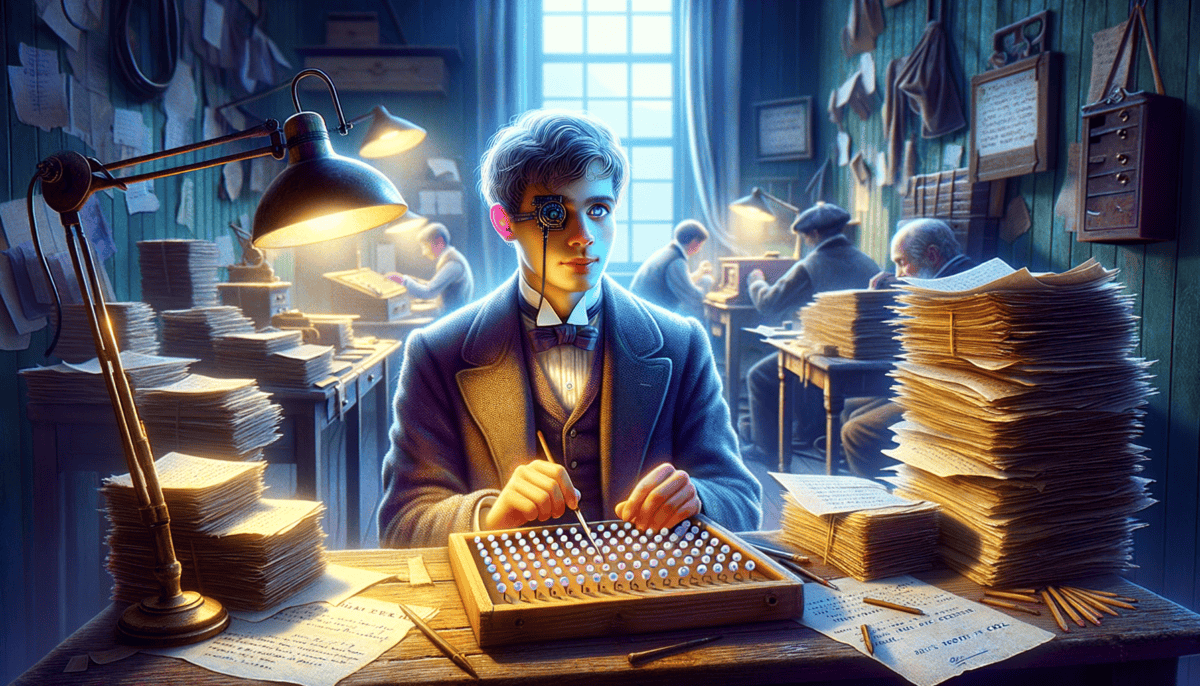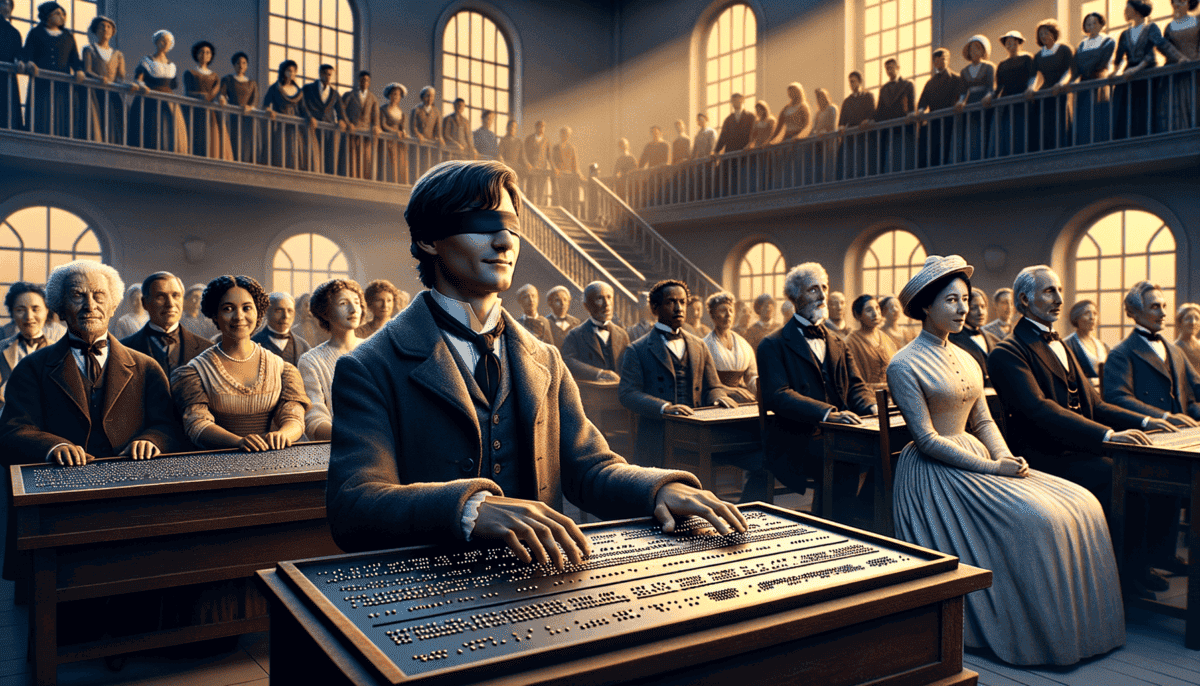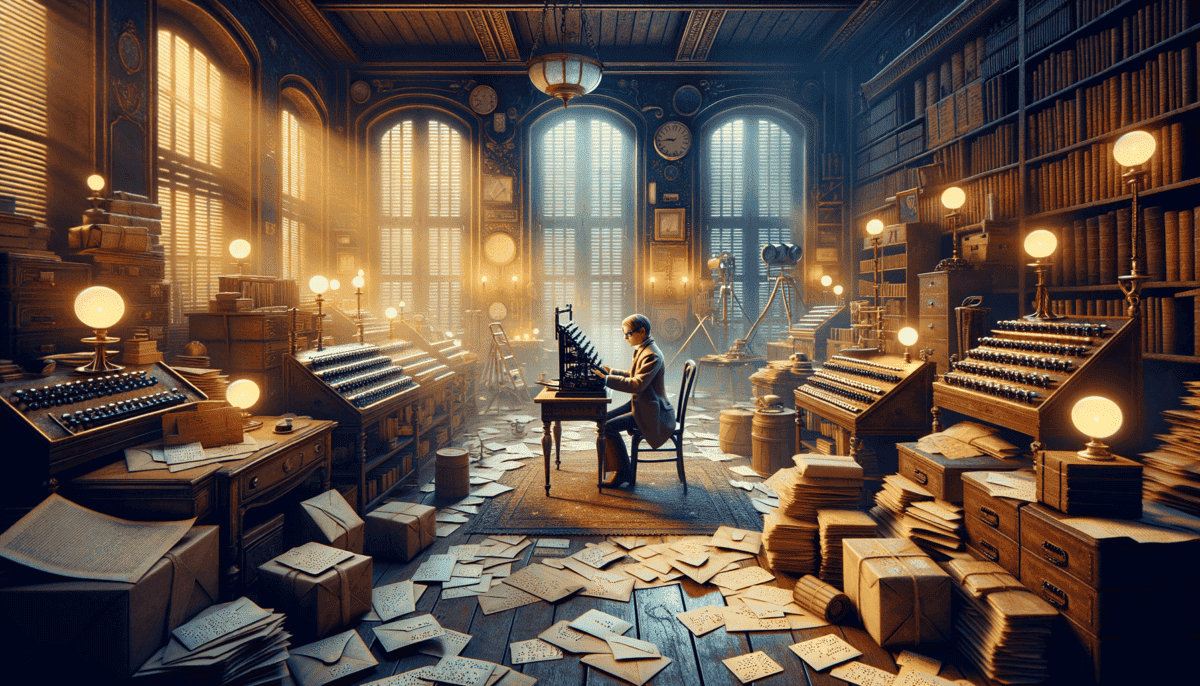Darkness Falls
In a small French village called Coupvray, a happy little boy named Louis lived with his family. The year was 1812, and Louis loved to watch his father make leather shoes in his workshop.
"Papa, can I help you today?" three-year-old Louis asked, his eyes bright with excitement.
"Of course, my boy," his father smiled, ruffling Louis's hair. "Just be very careful with the tools."
Little Louis loved spending time in the workshop. The smell of leather filled the air, and the sound of his father's tools made a gentle tapping rhythm. But one day, everything changed.
The tool was sharp and heavy. It slipped from his small hands. In a terrible moment, the awl struck Louis's eye. The pain was very bad, and Louis cried out.
"Mama! Papa!" he screamed.
His parents rushed to help him, but it was too late. The injury was serious, and soon an infection spread to his other eye too. By the time Louis turned five, he could no longer see anything at all.
"I can't see the flowers anymore, Mama," Louis said softly one day.
His mother hugged him tight. "But you can still smell them, my brave boy. And feel their soft petals."
A New Beginning
Even though Louis couldn't see, he didn't give up. He learned to find his way around by using his hands and feet. He listened carefully to every sound. His family helped him learn many things.
"Louis is so smart," the village teacher told his parents. "He remembers everything he hears. He should go to a special school in Paris."
At ten years old, Louis packed his small bag and traveled to the Royal Institute for Blind Youth in Paris. It was scary to leave home, but he was ready for a new adventure.
The school was big and different from anything Louis had known before. There were other children who couldn't see, just like him. They learned by touching raised letters on paper, but there weren't many books to read.
"These letters are so hard to feel," Louis told his new friend Gabriel. "And they take up so much space. There must be a better way!"
The teachers tried their best, but the books were few and heavy. Louis could only read a few words at a time. It was slow and frustrating.
But young Louis was determined. Every day, he practiced feeling the letters with his fingers. He dreamed of finding an easier way to read. He wanted all blind children to have more books.
"One day," he whispered to himself as he lay in his bed at night, "I will find a way to help us all read better."
The moon shone through his window, and though Louis couldn't see its light, he could feel its warmth on his face. Something amazing was about to begin, and he didn't even know it yet.
Seeds of Innovation
Louis sat in his classroom at the Royal Institute, his fingers tracing the big raised letters. He sighed with frustration.
“These letters are too slow to read,” Louis told his friend Gabriel. “My fingers get tired after just one page!”
The other students nodded in agreement. They all faced the same problem. The raised letters were hard to feel and took up too much space. A whole book could be as big as a table!
“This is night writing,” Captain Barbier explained. “Soldiers use it to read messages in the dark without making any light.”
Louis’s fingers danced over the dots. His face lit up with excitement. These dots were much easier to feel than the big raised letters!
“But Captain,” Louis said, “your code has too many dots. It’s still hard to feel all at once. What if we made it simpler?”
A New Idea Takes Shape
That night, Louis couldn’t sleep. His mind was full of ideas. He grabbed his slate and stylus – tools for making dots on paper.
“What if I use fewer dots?” he wondered. “Maybe six dots would be enough to make all the letters!”
Day after day, Louis worked on his new idea. He tried different patterns of dots. Some worked better than others. His friends helped him test his ideas.
“Look what I made!” Louis told Gabriel, showing him a paper with dot patterns.
“These are much easier to feel,” Gabriel said, touching the dots. “And they take up less space too!”
Louis worked hard to make his system perfect. He wanted each letter to make sense. He made dots for numbers too. Soon, he could write faster than ever before!
Sharing the Discovery
Louis’s teachers were curious about what he was doing. Some thought it was just a game. But Louis knew it was much more important.
“This could help all blind people read,” he told his teacher. “We could have more books, and they wouldn’t be so big!”
Not everyone understood Louis’s idea right away. Some people thought it was too different from regular letters. But Louis didn’t give up.
“Sometimes the best ideas seem strange at first,” his father had told him in a letter. “Keep working hard, my son.”
Every free moment, Louis worked on his dot system. He wrote stories for his friends to read. They were amazed at how quickly they could read the dot patterns.
As Louis fell asleep each night, he dreamed of a future where all blind people could read easily. His fingers tingled with excitement. He knew he was onto something big, something that could change everything.
The dots were like tiny stars under his fingertips, spelling out words and opening up a whole new world of possibilities. Little did Louis know, his simple idea would soon spark a revolution in reading.
The Breakthrough
Louis sat at his desk, his fingers moving quickly over the raised dots. His heart raced with excitement. After months of work, he had finally done it!
“Gabriel! Come feel this!” Louis called to his friend. “I think I’ve got it just right!”
Gabriel ran his finger over the dots. His face broke into a huge smile. “Louis, this is amazing! I can feel each letter so clearly!”
The six-dot system was like magic. By raising different dots in the cell, Louis could make all the letters of the alphabet. It was like a secret code that blind people could read with their fingers!
Showing the World
“But how will you show everyone it works?” Gabriel asked.
Louis took a deep breath. “I’ll teach other students first. Once they can read it, the teachers will have to see how good it is!”
He started teaching his friends during free time. They sat in circles, learning the new dot patterns:
- One dot at the top left meant ‘A’
- Two dots at the top meant ‘B’
- Three dots going down meant ‘L’
- Six dots all together meant ‘Q’
“It’s like learning a fun puzzle!” said Marie, another student. “And look how small our books can be now!”
Fighting for Change
But not everyone liked the new system. The school director shook his head when Louis showed him.
“It’s too different,” he said. “How will sighted teachers read it? We should stick to raised letters.”
Louis didn’t give up. He knew his system was better. “Please, sir,” he said. “Watch how fast we can read with it!”
Every day, more students wanted to learn the dot system. They practiced in secret during breaks and after classes. Louis taught them all, his fingers flying over the paper as he showed them how it worked.
Making It Better
“What about numbers?” asked Pierre, a new student. “And music notes?”
Louis smiled. “We can make special patterns for those too! The six dots can make many different symbols.”
He worked day and night to add more to his system:
✨ Numbers used the same patterns as letters, with a special symbol in front
✨ Music notes had their own special patterns
✨ Even math symbols got their own dot combinations
“You’re a genius!” Gabriel told him one day.
Louis shook his head. “No, I just want everyone to be able to read easily. Books shouldn’t be hard to read just because we’re blind.”
As the days passed, something amazing happened. Students using Louis’s system started doing better in their classes. They could take notes faster and read them back easily.
“Maybe,” Louis thought with a smile, “they’ll have to listen to us now.” His fingers traced the dots of a new book he was writing, each pattern a step closer to changing the world.
Proving the System
The classroom buzzed with excitement. Louis stood at the front, his hands steady on a page of raised dots. Twenty students sat eagerly, their fingers ready to learn.
“Today,” Louis announced, “we’ll show everyone how fast we can read with our dots!”
Marie raised her hand first. “Can I try reading the story out loud?”
Louis smiled and handed her the page. Her fingers moved smoothly across the dots, and she began reading clearly and quickly. The watching teachers gasped in surprise.
Winning Hearts
“This is remarkable,” whispered Mr. Laurent, a teacher who had doubted the system before. “She’s reading as fast as I can!”
One by one, students showed what they could do:
- Reading stories without stopping
- Writing letters to their families
- Taking notes in class
- Even solving math problems!
“Can you teach us too?” asked Miss Bernard, another teacher. “We need to learn if we want to help our students.”
Teaching the Teachers
Louis began afternoon classes for the teachers. He was patient as they learned the dot patterns.
“It’s like learning a new language,” said Mr. Laurent. “But it makes so much sense once you understand it.”
The news spread to other schools. Letters arrived asking about the amazing new reading system.
Growing Success
“Louis,” Gabriel said one day, “your system is changing everything! Look how many people want to learn it now.”
Louis nodded happily. “And this is just the beginning. Every blind person should have the chance to read and write easily.”
More wonderful things started happening:
✨ Students wrote their own stories
✨ They shared books with friends
✨ Some even started teaching their families
“Remember when they said it wouldn’t work?” Gabriel laughed.
“Now they’re asking for more books in Braille!” Louis replied with a grin.
New Challenges
But there were still problems to solve. Making Braille books took a long time. They needed special tools and paper.
“We need a faster way to make books,” Louis thought. He started working on a special machine to press the dots into paper.
Other schools wrote asking questions:
“How do we start teaching Braille?”
“Can you send us instructions?”
“Will you come show us how it works?”
Louis worked harder than ever. He wrote guides explaining how to teach Braille. He visited other schools when he could. Every day, more people learned about his amazing system.
“Your dots are like tiny stars,” said a young student one day, “lighting up the dark for all of us.” ⭐
Louis smiled, knowing his dream of helping blind people read was finally coming true. Each dot, each letter, each book was a step toward a brighter future.
Spreading the Light
The excitement about Braille spread like wildfire across France. Letters poured in from schools everywhere!
“Look at this one, Louis!” Gabriel waved a letter from England. “They want to learn about our dots too!”
Louis sat at his desk, his fingers dancing across paper as he wrote responses. “Every blind person deserves to read,” he said with a smile. “No matter where they live.”
Around the World
“Bonjour, Professor Braille!” called out Pierre, rushing into the classroom. “The ship captain delivered more letters. People in America want to learn too!”
Louis’s system was growing in amazing ways:
- Schools in England started teaching it
- German teachers came to learn
- Letters arrived from America
- Even places in Asia wanted to know more!
Making It Better
“We can make the dots work for every language,” Louis explained to visiting teachers. He spent long hours adjusting his system so it could be used everywhere.
“It’s like magic,” said a visiting teacher from Spain. “The same dots can work in any language!”
Working Hard
Louis worked day and night to help spread his system. Sometimes he got very tired.
“You should rest more,” worried his friend Marie.
“There’s too much work to do,” Louis replied. “Too many people are waiting to learn.”
Big Changes
More wonderful things started happening:
✨ Libraries began making Braille books
✨ Schools opened special Braille classes
✨ New tools were made for writing dots faster
“Remember when we started?” Gabriel asked. “Just a few students in one small room?”
Louis nodded. “Now look at us! Thousands of people reading with their fingers!”
Special Moments
One day, a little girl visited Louis’s classroom. “I can write to my mama now,” she said, hugging him. “She cried happy tears when she got my letter!”
Teachers came from far away to learn:
“This changes everything!” said an Italian teacher.
“Our students will love this!” exclaimed a teacher from Belgium.
Growing Dreams
Every new success made Louis dream bigger. “What if we could have Braille books in every school?” he wondered.
“And newspapers?” added Gabriel. “And signs on buildings?”
“Yes!” Louis smiled. “Someday, blind people everywhere will be able to read anything they want.”
The dots that started in a small French school were now spreading light across the world. Each new reader, each new book, each new country that learned Braille was a step toward Louis’s big dream coming true. ⭐
A Light That Never Dims
Today, millions of people use Braille all around the world! Louis’s little dots have changed countless lives.
“Can you believe it started with just six dots?” asked Marie, now elderly but still teaching at the school. She ran her fingers over a special plaque on the wall.
A Dream Come True
Just as Louis hoped, Braille can now be found everywhere:
- On elevator buttons
- In school books
- On medicine bottles
- Even on candy wrappers!
“Look at all these new Braille computers!” exclaimed a young student named Sophie, touching the modern equipment. “We can read anything now!”
Special Honor
People everywhere remember Louis Braille’s amazing gift to the world. In Paris, they built a special museum just for him! ️
“Teacher, tell us about Louis again!” asked a group of young students gathered around Marie.
“Well,” she smiled, “he was just a young boy who wanted to read…”
Making Life Better
Thanks to Braille, blind people can:
✨ Go to any school they want
✨ Work in almost any job
✨ Read their favorite stories
✨ Write their own books
New Adventures
“Watch this!” said Sophie, showing her friends how she could read messages on her special Braille phone. “I can text just like you!”
New technology makes Braille even more useful:
Braille computers
Digital Braille books
️ Braille printers
The Greatest Gift
“Louis gave us more than just dots,” Marie told her students. “He gave us freedom.” ⭐
A little boy raised his hand. “So Louis’s dots help people see with their fingers?”
“That’s right,” Marie smiled. “And they’ll keep helping people forever.”
A Bright Future
Every day, somewhere in the world, someone learns to read Braille for the first time. With each new reader, Louis’s dream grows bigger and brighter.
His simple dots continue to light up the darkness, helping people read, learn, and chase their dreams – just like he always hoped they would.






